Hercegovac Begs Cro PM 'Open Borders So I Can Send My Wife To Her Mother'
January 29, 2021 – Lockdown is apparently taking a toll on one Hercegovac. The man from Široki Brijeg wrote to Croatian Prime Minister Andrej Plenković and begged him to reopen the borders between Croatia and Herzegovina so he could eject his wife from the family home for a month and send her to his mother-in-law's
The message from Hercegovac Ante Zovko (Ante Marinkov) was reposted on the Facebook page Imocki crnjaci where it picked up some 3 thousand likes in less than 6 hours.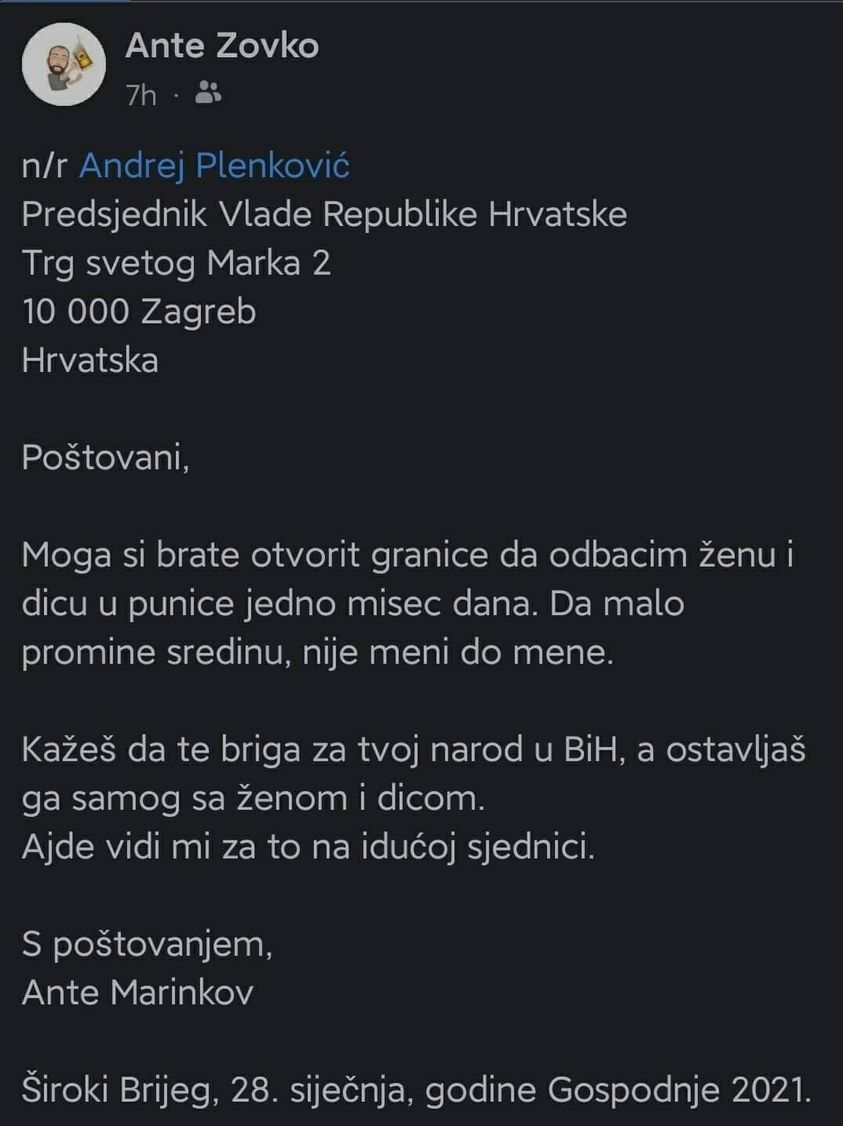
The town, Široki Brijeg, where this particular Hercegovac (a man from Herzegovina) lives is just 35 kilometres from the border with Croatia. Lots of Croatians live in this area, including this Hercegovac, his wife and his child. But not, it would seem, his wife's mother, who apparently lives in Croatia.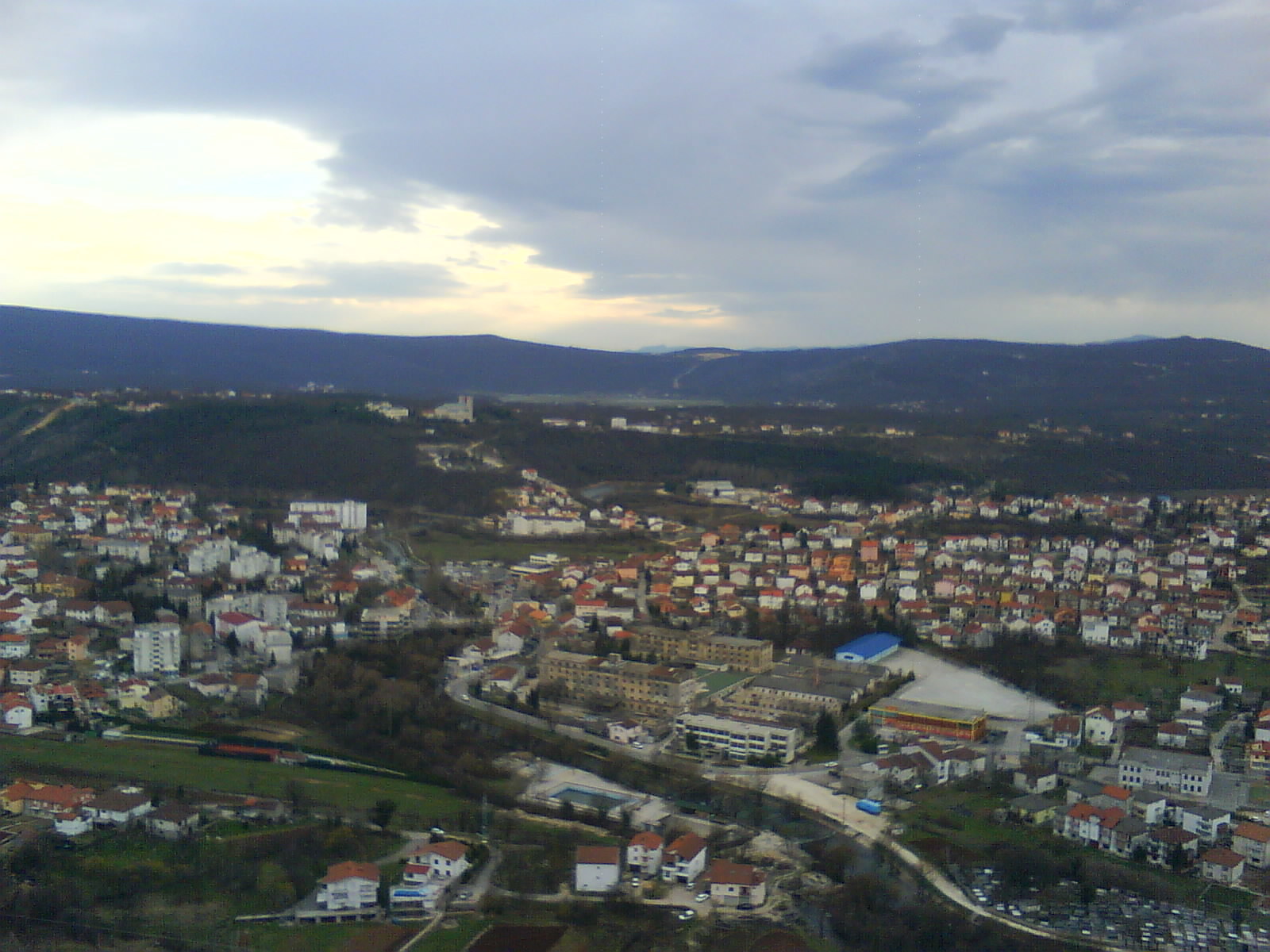 Široki Brijeg in Herzegovina, around 35 kilometres across the border from Croatia © Anto (talk)
Široki Brijeg in Herzegovina, around 35 kilometres across the border from Croatia © Anto (talk)
The Hercegovac's reason for wishing to eject his wife and child for a month was to change up the atmosphere for a time. One presumes he was not being entirely serious with his request.
The Hercegovac is not the first man to seemingly reach the end of his tether while restricted to staying in the family home. In April 2020, after just one month of being housebound, a man from a village near Osijek in Slavonia left his wife in the family home and went to live nearby in a tent.
Speaking anonymously at the time, the man's neighbour told the local SiB.hr news portal the couple have been happily married for 30 years. But, it seems the pressure of being around each other so closely during the lockdown was too much even for their strong union.
The neighbour was happy to report that since his friend pitched his tent in the nearby locale, relations between the man and his wife had actually returned to their usual levels of warmth and friendliness. The wife even came regularly to visit her husband in his tent. © John Waring
© John Waring
"My neighbour has been in his tent for a few days now,” he told the portal back in April. “He puts up a table and chairs in front. Occasionally our other neighbour comes over to drink some rakija (with him). I visited him too.”
The neighbour said his friend had quit the family home due to boredom more than anything else. Even after being happily married for 30 years, being around each other 24 hours a day was apparently just too much.
Perhaps in this more chivalrous response from the Slavonian man, Hercegovac Ante Marinkov could take some inspiration? After all, it's surely easier if one person departs from his family home in order to change the atmosphere than if two are forced to leave. Ante should find a nice spot in the fields nearby – not too close – and simply pitch up a tent. Problem solved! If he's lucky, his wife might come to visit bringing rakija.
Time To Reflect, As Loyalty Not Luxury Saves 2020 Croatia Tourist Season
September 28, 2020 – The tail end of 2020's unparalleled summer offers opportunity for pause, contemplation and appreciation, as it's loyal and not luxury guests that have saved this year's Croatia tourist season.
In this day and age, things always have to get better. There's no room to sit still. Life without improvement is deemed a failure. Nowhere is this more true than the Croatia tourist season.
The numbers of overnight stays in the Croatia tourist season sometimes seem to be the only measure by which its success is judged. Year after year, the numbers must rise. Any decrease is unthinkable. At the same time, hungry eyes still want more. Some want to reposition themselves. A new class of guest is wanted, from faraway nations. They must be of a better quality. They must stay longer, in more expensive dwellings. They must spend more.
Incredible initiatives are undertaken to turn this want into a reality. But, at the end of the 2020 Croatia tourist season, perhaps it's time to pause and reflect. For this year, it is undoubtedly loyalty and not luxury that's saved the Croatia tourist season.
In the year the coronavirus pandemic hit, arrivals by charter plane and cruise ship were seriously curtailed. So much for the flying visits of premium guests from far-flung lands. Instead, the tourists who came were from much closer to Croatia.
The English language that most on the coast are so familiar with was this year useless. On the beaches of Istria and northern Dalmatia, it was Slovenian, Polish, Czech, German, Slovakian and Italian that was heard. The packed bars of Makarska echoed with the familiar call of 'Đe si, bolan?' (where are you, bro? - in Bosnian dialect). Many of those who came drove to Croatia. And many do so every year.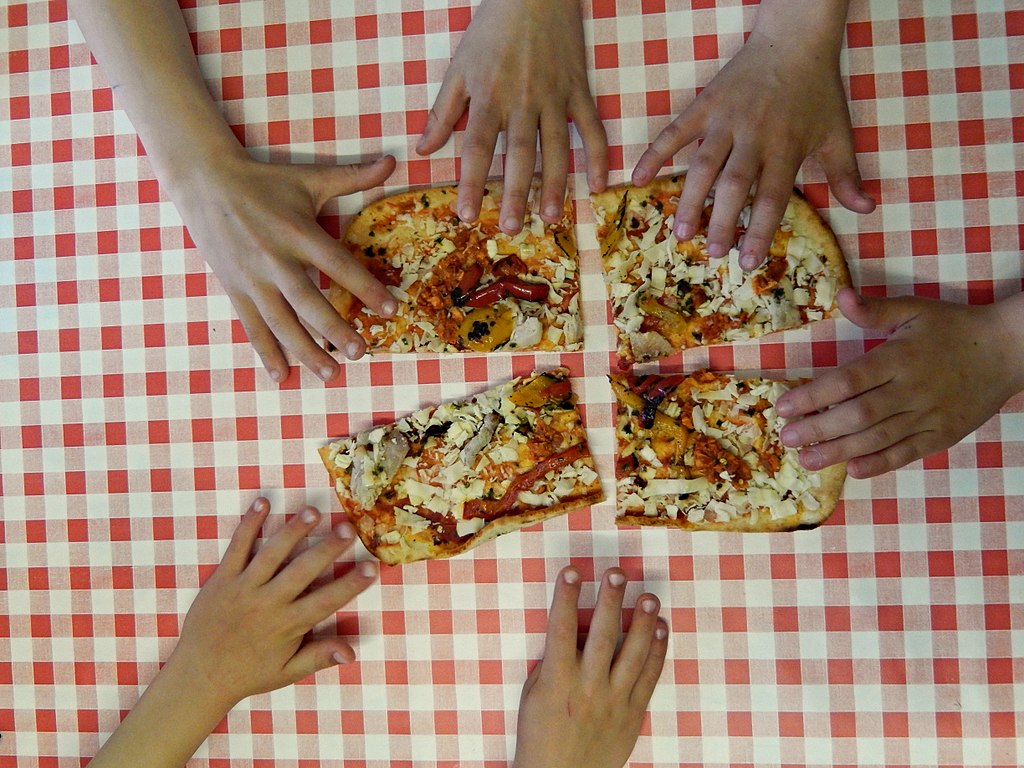 © Jeremy Segrott
© Jeremy Segrott
Sighs and light-hearted jokes about some of these guests persist in some places. “That family come every year, but they only ever order one pizza to share between the four of them.” The choice of footwear of some German-speaking and Czech visitors frequently draws chuckles, in particular, the classic sock and sandal combo. But, just where would the 2020 Croatia tourist season have been without the 60,000 Czech and Slovak visitors who this year arrived by train?
Just two days ago, Jutarnji reported on phenomenal numbers of Polish visitors this year. Would anyone else really have taken the place of the returning family of four sharing a pizza? Just what would the season in Makarska have looked like without bolan?
Croatians are famously very appreciative hosts. On the ground, there's no doubt that such loyal guests are warmly welcomed and thanked each year by accommodation renters, restaurateurs and others. They greet returning visitors with smiles of familiarity and reserve for them their favourite place. In September 2020, gratitude to such guests was echoed by The Croatian National Tourist Board as they launched a new campaign 'Thank you', directed at the tourists who this year chose Croatia.
Perhaps it is time to ensure that this gratitude extends into any grand new initiatives for growth in the Croatia tourist season? Such loyal guests should not be taken for granted, nor forgotten.
Initiative within the Croatia tourist sector is vital. The unlocking of continental Croatia's potential is simply a must. That too of the Dalmatian hinterland and inland Istria. The exploitation of world-class Croatian assets such as nature, agriculture and health and wellness services are also perfectly on-point. The desire to attract a better class of bigger-spending visitor to luxury holidays on the Croatian coast should surely be a lower priority. After all, eyes that covet can all too frequently fail to appreciate that for which they should already be thankful.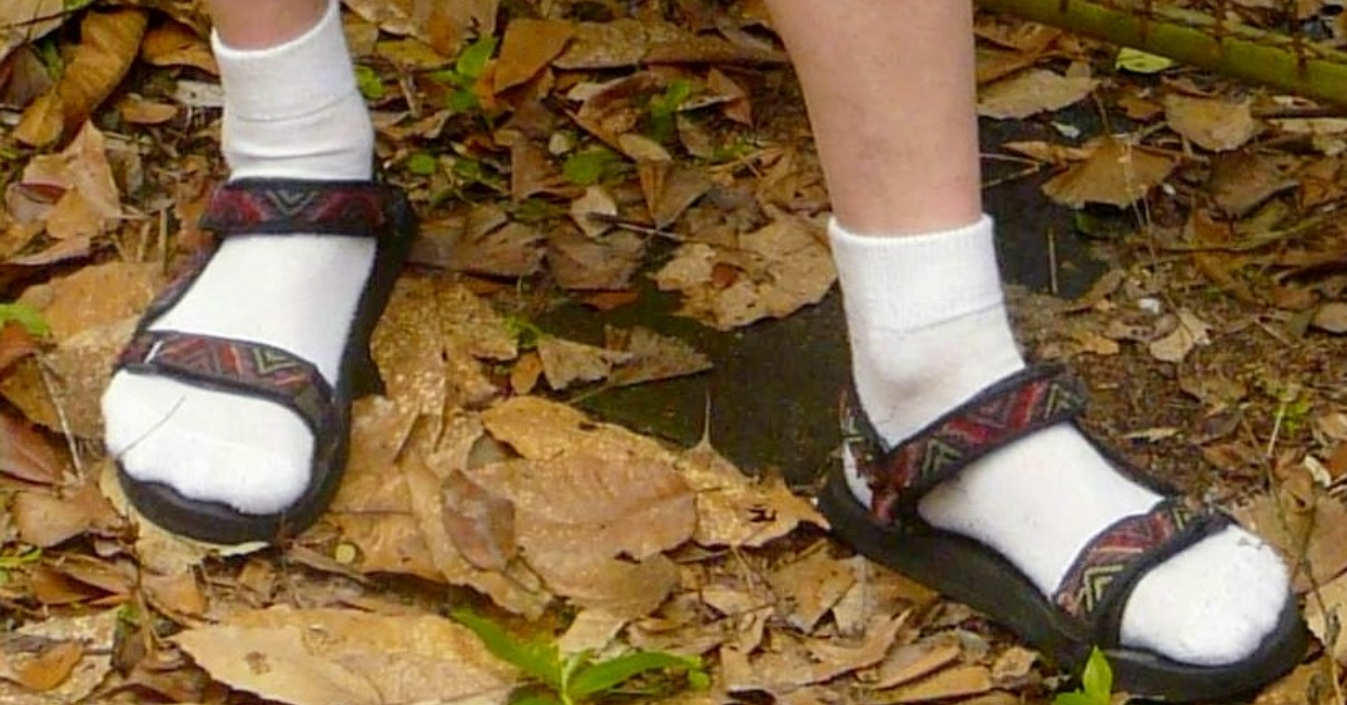 © Oddman47
© Oddman47
Lead image adapted from an original photograph by © Marco Verch
For the latest travel info, bookmark our main travel info article, which is updated daily.
Read the Croatian Travel Update in your language - now available in 24 languages
Hero Croatian Hospital Does Free Dentistry for All Special Needs Children
Wednesday, 9 September 2020 – Angels in white from heroic Croatian hospital Dr. fra Mato Nikolić in Nova Bila offer free dentistry for all special needs children
Few young people look forward to visiting the dentist. But, imagine how such a visit must be if the world is already a confusing and difficult place for you. These are the difficulties of dentistry for all special needs children.
“Children with special needs suffer from a range of disorders,” Dr. Nikola Matković tells TCN over the phone from Croatian hospital Dr fra Mato Nikolić in Nova Bila, near Vitez, central Bosnia. “They can have stunted mental development, autism, Down's syndrome, disharmonic development, epilepsy, cerebral palsy. They all need to put under general anesthetic for dentistry and, of course, that requires a specially trained anesthetist to be present throughout, as well as the surgeon dentist and several members of staff. It can be necessary to have between six and ten highly skilled medical professionals in the operation, depending on the case. And, of course, that's very expensive. The parents of many children simply don't have that kind of money.”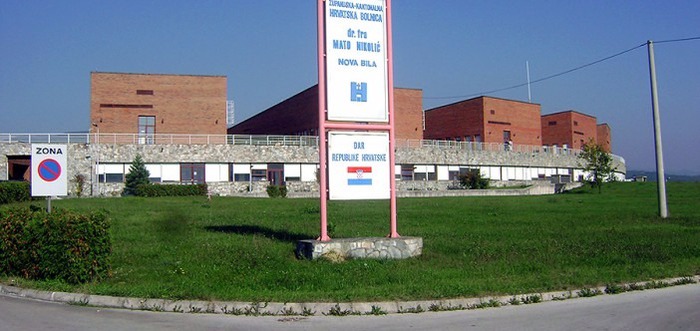
Croatian hospital Dr. fra Mato Nikolić in Nova Bila, which answered the call for free dentistry for all special needs children
A doctor of dentistry, Nikola Matković became acutely aware of the financial difficulties for many such parents in 2016, when NGO Betanija from Vitez put out a call for help. His main job is there, in the local health centre. They help provide care for about 50 special needs clients in the region. Responding to the call, Dr. Matković approached colleagues to see if they'd be interested in trying to help give free dentistry for all special needs children.
Dentist Lidija Lasić-Arapović and anaesthesiologist Zoran Karlović, both from Mostar, were quick to offer their assistance. They were followed by dentists Dr. Anja Hačimić, Dr. Ivana Dunđer-Vidović, Dr. Nikola Kezić, Dr. Ozrenka Raić from central Bosnia and assistants Slavica Šimić and Anita Martinović from Mostar. All agreed to join Dr. Matković in his attempt to offer free dentistry for all special needs children in their region.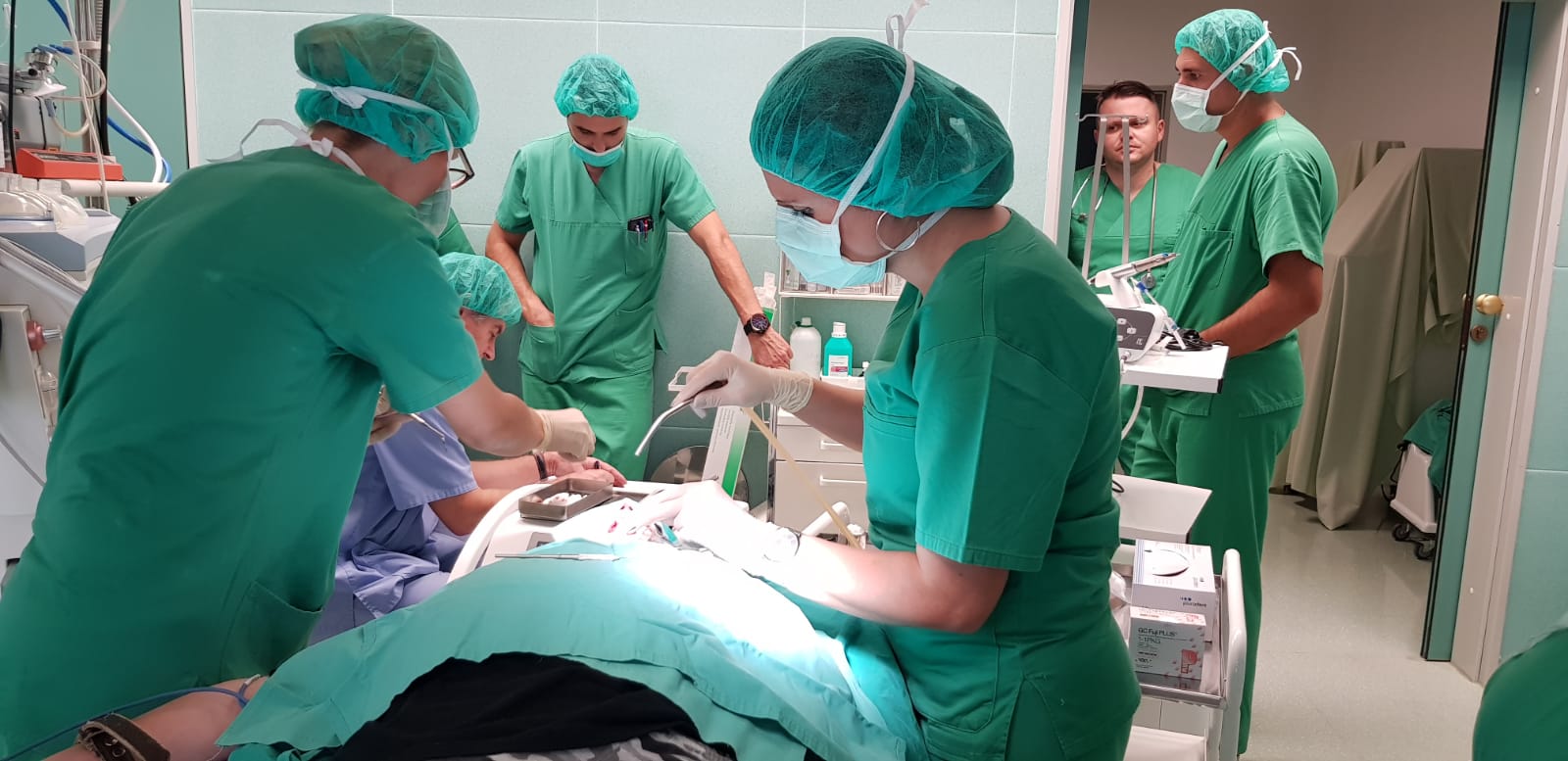
The team of Croatian hospital Dr. fra Mato Nikolić doctors at work, supplying free dentistry for all special needs children
Dr. Matković needed the approval of the Ministry of Health and of Central Bosnia Canton and authorities at the Croatian hospital Dr fra Mato Nikolić, lead by director Dr. Velimir Valjan, in order to begin the programme. Both quickly agreed that it was needed and agreed to contribute funding to help establish it. The programme of free dentistry for all special needs children in the Central Bosnia Canton region started in late 2018. But, that was just the beginning.
“We soon started getting calls from parents of special needs children from outside the region,” remembers Dr Matković. “And from full-time carers of adults who also have special needs. We soon realised we could not just leave them with nowhere to turn. We again approached the authorities and asked for permission to widen the programme and they were incredibly supportive. We've so far had around 120 clients, between the ages of six and thirty-five. And they've travelled here for treatment from every corner of Bosnia.”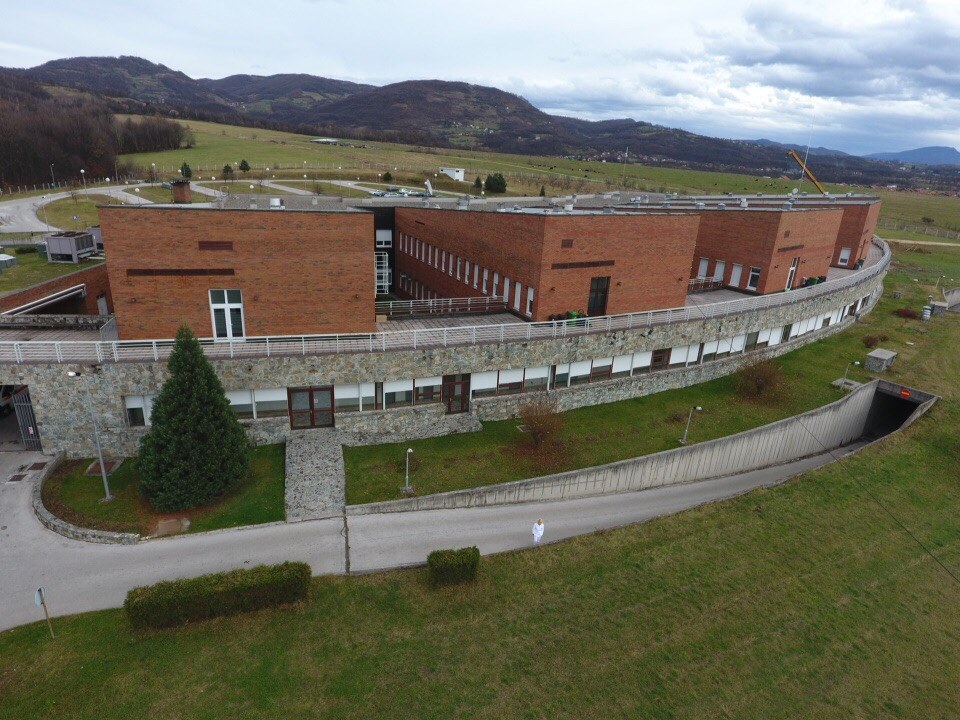
Croatian hospital Dr. fra Mato Nikolić. Welcoming all ethnicities and people of all religions, it gives free dentistry for all special needs children
For an outsider – such as this writer – if can be baffling to try and understand how Bosnia and Hercegovina works. The country is populated by the same people, although they've been separated for hundreds of years by three competing religions. This separation led to ethnic tensions rising during the break up of Yugoslavia, leading to Bosnia now being split up into several internal cantons under one federation, another autonomous state - Republika Srpska - plus the self-governing district of Brčko.
“This question may be stupid, but is healthcare the same in Bosnia as it is in Croatia?” asks this British member of the TCN team, rather naively. “Do you have the same option of health insurance to all the people who live there, no matter where they live? And, you're called Croatian hospital Dr fra Mato Nikolić. Does that mean that you treat only Croats? Do Muslims and Serbs have their own separate hospitals?”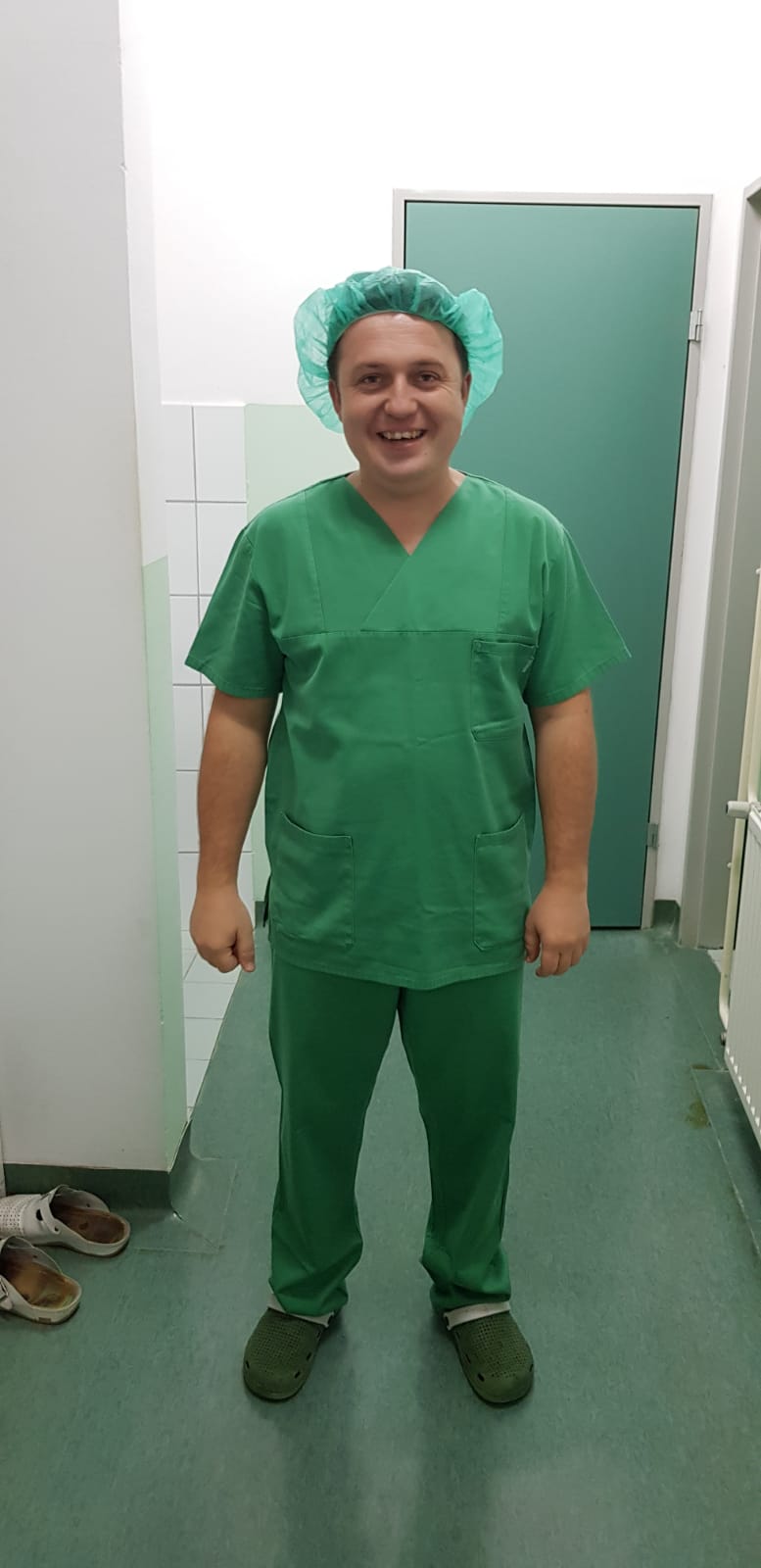
Dr Nikola Matković
“Ahahaha, it's not such a stupid question really,” laughs Dr Matković. “Bosnia can be a confusing place. Well, the answer to your first question is no. It's not the same as in Croatia, it's a lot more complicated because there's a completely separate system for those who live in Republika Srpska. But, I'm pleased to say that we have overcome all the bureaucracy and difficulties to be able to treat patients from every part of Bosnia, including Republika Srpska. The NGO Betanija who set the ball rolling is a multi-ethnic organisation. They welcome people of every ethnicity and religion. So do the Croatian hospital Dr fra Mato Nikolić and this programme within it. Our hospital is called Croatian hospital because it was set up with great financial assistance from the Croatian government.”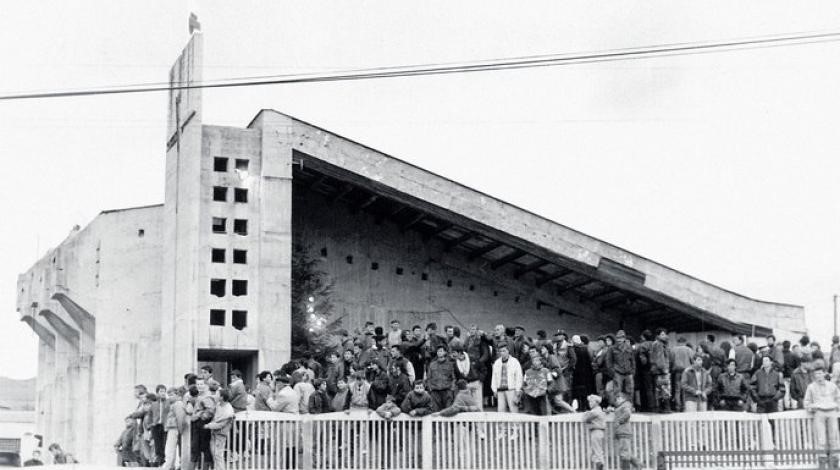
The parish church of the Holy Spirit in Nova Bila became the only medical resource for some 70, 000 trapped people during the war. Around half of them were refugees.
Croatian hospital Dr fra Mato Nikolić is named after a prominent Bosnian Franciscan, humanist and the first graduate doctor from Bosnia and Herzegovina - Fr. Mato Nikolić (1776-1844). It is a hospital known throughout Bosnia and Croatia because of the heroic work undertaken there by staff and volunteers during the time of war.
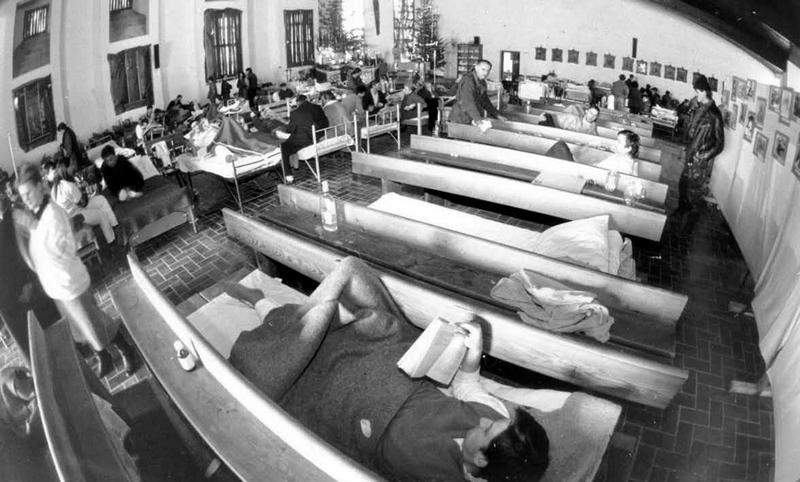
The church hospital in the time of war
In 1992, violent fighting caused a huge wave of forced migrations all across Bosnia. In the area where the hospital is now situated, the population almost doubled with the arrival of refugees. Some 70,000 people found themselves in an area 30 kilometers long and 2 kilometers wide. They were cut off from the rest of the world by the lines of fighting and by blockades. No hospital existed within the area, just the parish church of the Holy Spirit in Nova Bila. From there, a few healthcare professionals worked day and night, with almost no supplies, to treat the sick and wounded. So cut off was this group of people that they faced famine. The absence of any medical supplies was secondary to the very real threat of starvation.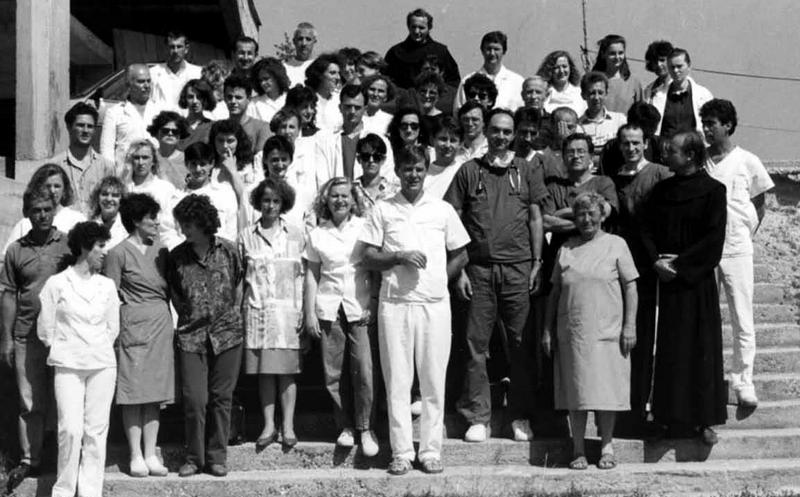
Staff of the war hospital Fr. Mato Nikolić pictured in 1993
War hospitals set up to try and deal with the trapped people proved ineffective, as the lines of fighting were constantly shifting. But, at the end of 1992, it was decided that the church in Nova Bila would be established as the main hospital for all those within the four municipalities of Travnik, Novi Travnik, Vitez and Busovača in the Lašva Valley. This war hospital took the name Fr. Mato Nikolić.
Despite having no regular supplies of electricity or even water, between 19 October 1992 to 1 April 1994, over 20, 000 people were treated and cared for in the hospital. 1,260 operations were performed under general anesthesia, 4,200 under local anesthesia. 721 children were born.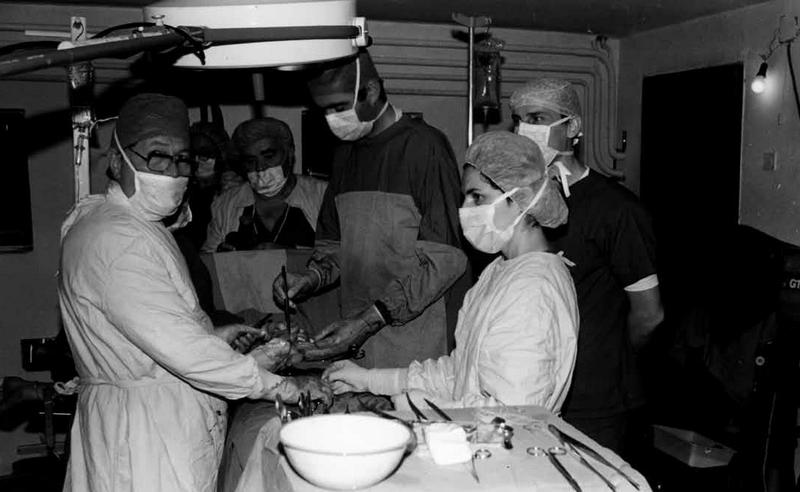
Despite having no regular supplies of electricity or even water, between October 1992 to April 1994, over 20, 000 people were treated and cared for in the hospital. 1,260 operations were performed under general anesthesia.
In June 1994, the President of the Republic of Croatia, Dr. Franjo Tuđman, visited the Lašva Valley and promised to build a new hospital. The new Croatian hospital Dr. fra Mato Nikolić was opened in 1999. Its pioneering programme to offer free dentistry for all special needs children from across Bosnia is just the latest commendable action undertaken by those associated with this hero hospital.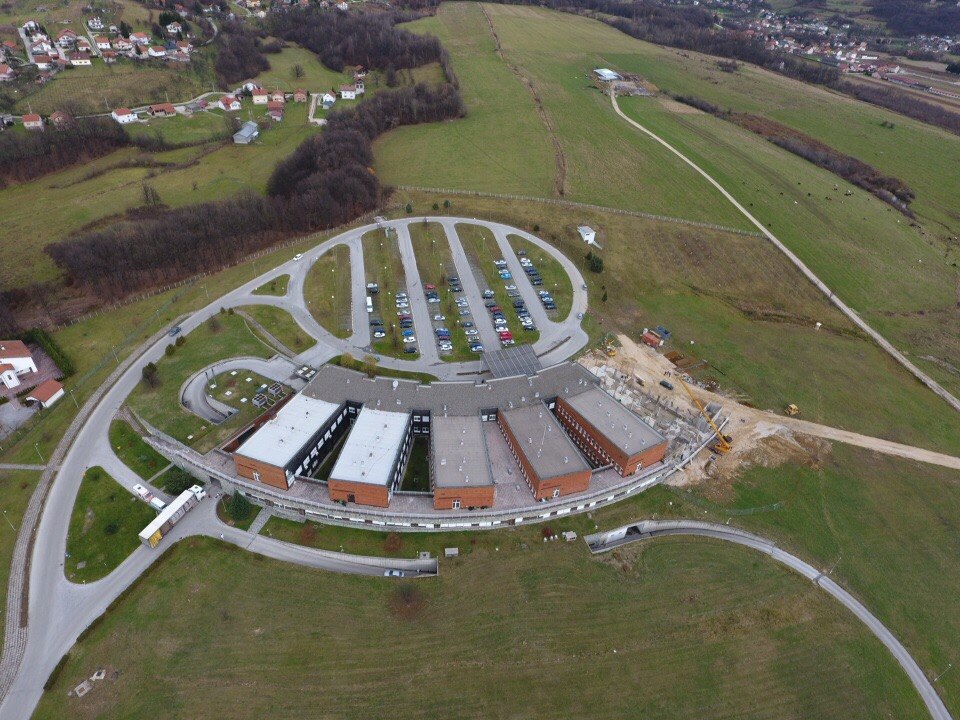
How the new Croatian hospital Dr. fra Mato Nikolić looked a few years ago, as its sixth wing was being constructed
All colour photographs © Croatian hospital Dr. fra Mato Nikolić, Dr Nikola Matković and municipality of Vitez
All black and white photographs © Bijeli Put documentary, original sources Davor Višnjić, Željko Maganjić, Srećko Stipović, Arhiv konvoja Bijeli put, Arhiv Kruh svetog Ante, Foto klub Split
For the latest travel info, bookmark our main travel info article, which is updated daily.
Read the Croatian Travel Update in your language - now available in 24 languages
Croatian Tourist Agency Replaces Mosques with Churches on Mostar Photo
A rather bizarre act of photoshopping on a photo of ''snowy Mostar'' by a certain Croatian tourist agency, as the ancient city in Bosnia and Herzegovina has its mosques replaced with what appear to be Catholic churches.
As Poslovni Dnevnik writes on the 23rd of December, 2018, the Croatian tourist agency in question is based in Split and ironically also organises trips to Mostar and Međugorje in neighbouring Bosnia and Herzegovina, a country with a large Bosnian Muslim population.
The Croatian tourist agency, Adriatic travel, has rather oddly published an iconic photograph of Mostar on its website, where two photos of the old Mostar mosques, Hadži-Kurt and Nezir-agina were ''dealt with'' thanks to photoshop, seeing them replaced by the typical bell towers of Franciscan churches and cathedrals, as well as several crosses.
Several portals over in Bosnia and Herzegovina have already written about this strange act of photoshopping out Mostar's history, and the photo has been published as promotional material by the Split-based Croatian tourist agency. It appears that the tourist agency has realised they have been caught in a rather offensive act, and after a few hours, the portals in BiH reported that the weird photo had been deleted from the tourist agency's website, according to a report from Novi list.
However, despite having been removed from the agency's website, the photo is still on show at the actual address of the Croatian tourist agency itself. The Bosnians have decided to retaliate to this somewhat offensive ''deleting'' of part of Mostar's history, so they decided to be just as petty, photoshopping a well-known panorama view of Split, but instead of being able to see the tower of St. Duje dominating the landcape, they've replaced it with a mosque.
Make sure to follow our dedicated lifestyle page for much more.
Croatian Emigrant at Pearl Harbour: How Petar Tomić Became American Hero
Ever heard of the Croatian emigrant at Pearl Harbour? His bravery not only saved many from certain death, but saw him sacrifice his own life during the infamous Japanese attack.
As Morski writes on the 8th of December, 2018, Petar Herceg Tomić was a Croat born in Prolog, a village in the Municipality of Ljubuški, Bosnia and Herzegovina, in 1893. He became an American hero in World War II for his heroism and sacrifice during the Japanese attack on Pearl Harbour on December the 7th, 1941, in which he lost his life. He was posthumously awarded the medal of honour, the highest American medal symbolising great courage, according to Novi list.
Just how did this boy from quiet, rural Ljubuški become a Croatian emigrant at Pearl Harbour?
Among the first victims of the sudden Japanese attack on Pearl Harbour on December the 7th, 1941, which began the brutal Second World War on the Pacific, was the American Utah battleship. Hit with two torpedoes, the vessel began to turn over, and only the sheer courage and devotion of Officer Petar Tomić prevented more casualties. Paying the price of his own life, Petar Herceg Tomić saved the rest of the crew from certain death.
Tomić mainaged to maintain the part of the vessel hit by the two torpedoes until most of the crew left it. All this was done under merciless Japanese aircraft. As the ship began to fail, Tomić encouraged the crew to escape. During that terrifying time, he controlled the pressure so as to avoid a devastating explosion, as in such a case, even those who were rescued would also have been killed. Despite his brave efforts, Tomić and another 58 crew members, remained forever captured in the vessel.
In the official explanation of the recognition of his bravery and priceless sacrifice, it states that Tomić, upon realising that the Utah battleship was definitely doomed, remained in his position in the engine room until he was convinced that the boilers were secured and all the staff had departed from the doomed ship's engine room. By sacrificing his own life, he saved the lives of his crew, writes the Virtual Museum of the Emigration of Dalmatia (Virtualni muzej iseljeništva Dalmacije).
Tomić was born, as stated, in Prolog, a small village which consisted of just 120 houses, in 1893. His real name was Petar Herceg, and his family nickname was Tonić, which he later transformed into his last name, Tomić. He arrived in America in 1913 and joined the army. After the First World War, he joined the Navy, where he became the chief engineer on the Utah battleship. This fateful move was how he found himself in Pearl Harbour when a sudden attack by Japanese forces on the US Navy's main base in the Pacific led the US to enter the Second World War on the side of the Allies.
The remains of the Utah battleship still lie in Pearl Harbour, and along with it lies a memorial and a plaque honouring the Croatian emigrant at Pearl Harbour's heroic deed. The plaque was initially placed there to mark the 30th anniversary of the attack.
One year after Tomić's death, in December 1942, an escort destroyer named U.S. Tomić was built at the Brown Shipbuilding Shipyard in Houston. For thirty years, the vessel served in the American Navy, before being removed from the register, and eventually ending its military ''career'' in 1974. President Franklin D. Roosevelt posthumously awarded Tomić the Medal of Honour.
No matter the incredible turn of events the life of this Croatian emigrant took, nothing was so incredible as the search for his living descendants, to whom the medal was handed. After nearly a decade of searching, and even judicial proceedings, Robert Lunney eventually found Tomić's descendants, still living in Prolog, Herzegovina. After six and a half decades, the prestigious American medal of honour was awarded to Petar Herceg Tomić's living family back in 2006 on the deck of the largest carrier of the US Navy Enterprise aircraft, which was inaugurated near Split.
Croatian Television (Hrvatska televizija) produced a documentary film entitled "Heroes are not forgotten" which detailed this Croatian emigrant at Pearl Harbour's unusual life and heroic sacrifice on that fateful day. Made by Ištvan Filaković, its screenwriters are Vladimir Brnardić and Nenad Bach.Make sure to follow our dedicated lifestyle and diaspora pages for much more.Click here for the original article by Novi listMate Rimac to Establish Technology Park in Livno, Bosnia and Herzegovina
Mate Rimac goes from strength to strength.
National Museum of Bosnia and Herzegovina to Open Exhibition on Zadar
Some time in the neighbour's spotlight for Zadar.
Croatian Chamber of Commerce to Open Office in Mostar, Bosnia and Herzegovina
The opening of the Croatian Chamber of Commerce in Mostar will be another step towards strengthening the export orientation of the Croatian economy, as well as long-term sustainable economic growth.
Grabar-Kitarović says Bosnia and Herzegovina has no Greater Friend than Croatia
ZAGREB, January 17, 2018 - Croatian President Kolinda Grabar-Kitarović said in Sarajevo on Wednesday that Croatia had always been and would remain Bosnia and Herzegovina's friend as well as a strong advocate of the equality of all its peoples and citizens, expressing at the same time regret about unnecessary political conflicts between the two countries' officials over the past weeks, including accusations against her coming from Bosnia and Herzegovina.
President: Pelješac Bridge will be Built; Is Not Directed Against Bosnia's Interests
ZAGREB, January 17, 2018 - Croatian President Kolinda Grabar-Kitarović said on Wednesday there were no obstacles to the construction of Pelješac Bridge, emphasising that it was a very important development project for Croatia and posed no threat to the interests of Bosnia and Herzegovina.


